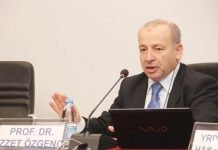The new government decree released in Turkey on Sunday to provide immunity and impunity to the pro-government civilians, who allegedly struggle against controversial coup attempt and “terrorist acts” following the attempt, has drew ire from the opposition circles and Turkish public.
The Article 121 of Decree Law No. 696, which has been interpreted as a “licence to kill” for radical Islamist and neo-nationalist pro-government circles, reads: “Regardless of their official duties, or appointments, any individuals who took part in suppressing the attempted coup d’état on July 15, 2016, terror acts, and other acts which are considered to be a continuation of these, will be subjected to the first clause [on immunity].”
The main opposition Republican People’s Party (CHP) slammed the government over a new state of emergency decree issued on Sunday, saying it paves the way for armed civilian gangs in Turkey, CNN Türk reported.
“Where do you find this sort of article? In fascist, military states, where states aim to frighten civilians with paramilitary forces. This is an article paving the way to the establishment of armed civilian gangs by the government, an article preparing a substructure for it,” said Bülent Tezcan, deputy chairman and spokesperson of the CHP, during a press conference.
“This article is a disguised amnesty. It says those who perpetrated such a crime in the past will be forgiven,” added Tezcan.
Tezcan also criticized the government for imposing jumpsuits for all convicts and suspects in pretrial detention for crimes against the constitutional order.
“It is a violation of the presumption of innocence. It is a sign of prejudice and revenge. No one can know who will wear that jumpsuit tomorrow,” he said.
The CHP’s Tezcan emphasized that they would take the new state of emergency decree to the Constitutional Court.
An earlier decree law (No. 6755 ), later approved by the Turkish Parliament, provided immunity for state officials who took part in stopping the coup attempt.
CHP deputy Sezgin Tanrıkulu has tweeted that the new decree is a kind of message and guarantee to Gladio-JİTEM-Hizbullah-like illegal armed structures for the future: “You commit a crime, and we’ll enact a law to save you.”
Tanrıkulu has also said that according to the new post-coup executive decree (KHK) there will be no legal, administrative, financial or criminal responsibility for civilians involved in the suppression of events. Tanrıkulu pointed out that this situation reassures paramilitary groups.
According to a report published by Artı Gerçek news portal, Tanrıkulu stated that such an arrangement could provide assurance to paramilitary organizations other than the security organizations authorized by law, for example, in the case of a resurgence of a period such as the Gezi Protests of 2013.
“Apart from the security forces authorized by law, this regulation paved the way for groups like the SADAT, the Ottoman Gang, the People’s Special Operation (HÖH) and other gangs which we know or do not know,” told Tanrıkulu by adding that they can make a legislation after giving instructions to repress such a protest like the Gezi.”
SADAT, which has also been called Turkish autocratic President Recep Tayyip Erdoğan’s “secret army”, was directed by retired Brig. Gen. Adnan Tanrıverdi, who was appointed as an adviser to President Erdoğan. Tanrıverdi is known for his Islamist ideology and has counseled Erdoğan for years although in an unofficial capacity, columnist Abdullah Bozkurt wrote for Turkish Minute on Nov. 25.
Tanrıkulu told that this decree of law is against the Constitution as it is contrary to the criminal law because a criminal offense cannot be excluded from the penal code. Speaking of the previous examples, Tanrıkulu stated that the Constitutional Court abstained from examining such a Decree of Law. He said, “There is no domestic remedy for those who have suffered by the actions of civilians during the failed coup attempt. Directly appealing to the European Court of Human Rights is opened,” he said.
Turkey’s former President Abdullah Gül has also joined opposition politicians in criticizing the content of the decree calling on the government to revise it. “The ambiguity that does not comply with the legal phrasing of the decree law no. 696 is worrisome in regards to the rule of law. I hope it will be revised to avoid developments that could sadden all of us in the future,” Gül said on his Twitter account on Monday.
Meral Akşener, the leader of the recently found İYİ Party (Good Party), on Twitter warned a “civil war” could be unleashed with the decree. “Granting civilians the right to use guns, while attributing it to [defense] against a coup attempt, with a government decree means pushing the country into civil war. Avoiding parliament for such a crucial law despite a majority and introducing a government decree instead may have even more serious consequences,” Akşener said on Dec. 25.
The deputy chairs of the pro-Kurdish Peoples’ Democratic Party (HDP) group in parliament said the government is bidding to suppress opposition with decree laws. “The government sees the end of the road and thinks it can prevent democratic opposition, the peoples’ objection to current economic conditions, strikes and resistance through this way,” they said.
HDP deputy Ziya Pir has also said that “The decree gives exemption from punishment for civilians. This move legitimises paramilitary groups in Turkey.”
Even Metin Feyzioğlu, the head of the Bar Associations in Turkey, who is known with his support to Erdoğan regime’s numerous anti-democratic, unlawful implementations and human rights violations, has also said that such a law granting immunity to civilians who confronted the July 15 coup attempt and terrorist acts that followed it would result in “people shooting each other in the head on the streets.” “I was terrified when I inspected the decree law no. 696. I was very sad,” Feyzioğlu said.
“I have always thought that the fight against reason would have a limit. I hope they will be brought to reason at some point. I really do not understand what they are doing,” he said. “What does parliament exist for? Why did this nation protect the parliament on July 15?” he said, addressing the president, the prime minister and the ministers who signed the decree.
Feyzioğlu has also said in a video that “Who will decide what actions are the continuation of the July 15 coup attempt?.. Citizens are going to shoot one another in the head in the streets … I’m sure this isn’t what you want to happen, is it, Mr. President?”
“Mr. President,” Feyzioğlu said “How did you publish this clause, which allows civilians to kill one another, and which says ‘Kill! You will not be punished at all’?.. Even tribal states do not have such a clause.”
Kerem Altıparmak, a human rights lawyer from Ankara University, underlined in a tweet that with the new decree the worst human rights violations and all kinds of crimes have been legitimized under the cover of fighting terrorism. Recalling that the Turkish Constitutional Court has approved the government’s state of emergency decrees, Altıparmak called on victims and their relatives to go directly to European Court of Human Rights (ECtHR). Today’s clause provides ‘absolute impunity’ to civilians who killed or wounded others during the night of the coup, said Altıparmak.
Human rights advocate Ömer Faruk Gergerlioğlu has summarized the new decree in a tweet: “If you make an innocent protest and someone kills you, he may not be punished. What else could be done to show that the state of law has ended?”
“Erdoğan regime has welcomed private participation in witch hunts against Erdoğan enemies. Now pro-state vigilantism is formally legal,” tweeted Timur Kuran, a professor of economic and political development at Duke University.
Lawyer Hüseyin Ersöz noted the ‘continuation’ clause, and said, the laws cannot lift legal liabilities of a person before the act, “this is against rule of law.”
However, while responding to criticism against the decrees, ruling Justice and Development Party (AKP) deputy chair Cevdet Yılmaz said the decree laws are open to inspection by parliament. Earlier on Monday he appeared on a TV channel to defend a wider interpretation of the decree, saying that “Citizens who do not have links to terror should not be concerned.”
On the contrary, AKP spokesman Mahir Ünal has also claimed that the decree with the force of law that appeared to give a carte blanche for violence against “terrorists” by civilians is solely retroactive. While explaining that the decree was passed in order to protect those who had fought the July 15 coup attempt, “The sentence is already in the decree,” Ünal said. “Where it says “the continuation’ (of the coup) up until the morning of July 16.”
“This expression was used from the perspective of the lawmaking techniques we have here. There is no expression there that encompasses other terror events,” claimed Ünal and added that “It was clear and obvious” that this only legitimised actions that would usually be considered crimes between July 15-16. Could certain people please not leverage this into a crisis.”
Whereas, the decree acquits “people who acted to suppress the July 15 coup attempt and terrorist actions as well as actions that represent the continuation of these.”
Turkey survived a controversial military coup attempt on July 15, 2016 that killed 249 people. Immediately after the putsch, the Justice and Development Party (AKP) government along with President Erdoğan pinned the blame on the Gülen movement.
Gülen, who inspired the movement, strongly denied having any role in the failed coup and called for an international investigation into it, but President Erdoğan — calling the coup attempt “a gift from God” — and the government initiated a widespread purge aimed at cleansing sympathizers of the movement from within state institutions, dehumanizing its popular figures and putting them in custody.
Turkey has suspended or dismissed more than 150,000 judges, teachers, police and civil servants since July 15. Turkey’s Interior Minister announced on December 12, 2017 that 55,665 people have been arrested. Previously, on December 13, 2017, The Justice Ministry announced that 169,013 people have been the subject of legal proceedings on coup charges since the failed coup.















